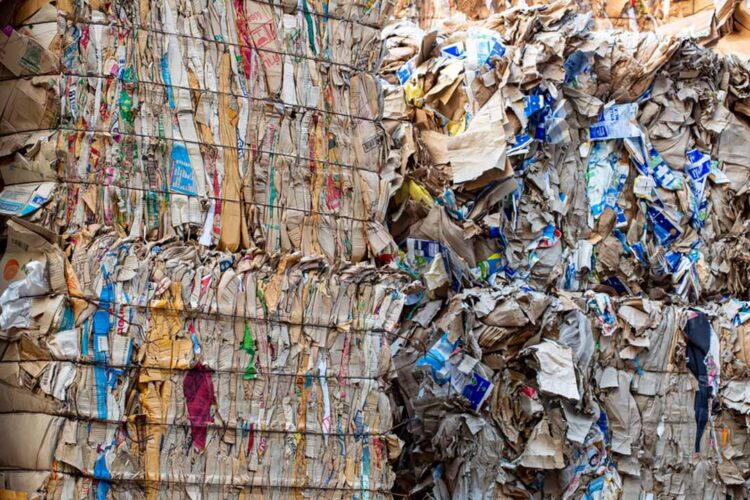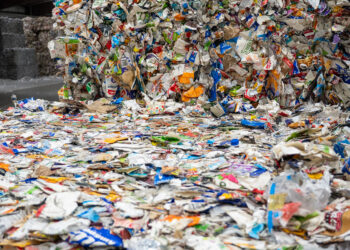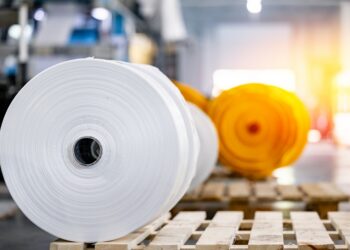The U.S. paper and OCC recycling rates for 2021 were 68.0% and 91.4%, higher than the previous year, the American Forest & Paper Association announced in a press conference May 24.
Terry Webber, American Forest & Paper Association (AF&PA) vice president of industry affairs, said the paper rate is on par with the industry’s highest previous rate, recorded in 2018. In 2020, the rate was 65.7%.
“Our industry is a responsible producer,” Webber said, noting that in 2021 about 80% of U.S. paper mills used some recycled paper and about one-third used only recycled paper.
U.S. mills took in 4.1 million tons of mixed paper, 2.6 million tons of high-grade deinking (essentially sorted office paper), 967,000 tons of pulp substitutes and 945,000 tons of newspaper in 2021, AF&PA previously reported.
The OCC recycling rate of 91.4% is up from 88.8% in 2020, Webber said. In 2021, mills consumed 24.3 million tons of OCC, the highest level ever.”Our industry is making additional investment to build on this progress,” he said, with an estimated $5 billion in investments planned through 2024.
A 2021 survey found that about 94% of U.S. residents had either curbside or drop-off recycling service for at least one type of paper. At the press conference, Webber also reiterated the industry’s position against extended producer responsibility (EPR) legislation that has been proposed or passed in several states, saying that any law should not affect the paper industry’s planned investments and give the industry credit for its success.
“Paper recycling is stronger than ever and remains an environmental success story,” said AF&PA President and CEO Heidi Brock in a press release.
AF&PA’s latest survey of the industry found that recovered paper consumption at U.S. paper and paperboard mills hit the highest level since 2008.
According to the group’s Paper Industry Capacity and Fiber Consumption Survey report, U.S. paper and paperboard mills increased the weight of recovered paper they consumed by 3.9% in 2021. That resulted in the highest recovered fiber consumption at U.S. mills ever.
Learn more in person
Key paper recycling trends will be fully explored in “The Future of Fiber Markets” session at the 2022 Resource Recycling Conference in August in Austin, Texas. The discussion will feature Bill Moore (president of Moore & Associates) and Martino Tavolato (U.S. director at Vipa Group). See full details on the session lineup and get registered today.Last year also marked the ninth consecutive year of increases in the share of total fiber feedstock that came from recycled sources, from 36.0% in 2012 to 41.6% in 2021.
Less demand for printing and writing paper, more for packaging
According to the survey, overall U.S. paper and paperboard production capacity declined 0.4% in 2021, less than the average decline of 1.0% per year since 2012. And in response to shifting demands, the industry has repurposed nine machines to produce packaging grades, the survey said.
On a more granular level, containerboard capacity increased for the 11th consecutive year, reaching a record high of 42.3 million tons.
“Containerboard capacity expanded at its fastest rate in 25 years,” a press release said. “As a result of these increases and decreases in other grades, containerboard share of total paper and paperboard capacity exceeded 50% for the first time in 2021.”
Boxboard capacity increased 0.6% in 2021, after a 2.5% decline in 2020. It previously had a long-term trend of a 0.4% decline. The survey found that tissue paper capacity remained the same.
“Survey responses indicate total paper and paperboard capacity will remain flat in 2022, with increases in boxboard and newsprint, stability in containerboard and tissue and declines in printing-writing,” the press release said.
The survey covers all major grades of paper, paperboard and pulp, as well as fiber consumption, based on a survey of all U.S. pulp and paper mills. According to the press release, the data includes responses from companies representing more than 88% of U.S. paper and paperboard industry capacity, with estimates completing the data set.





























